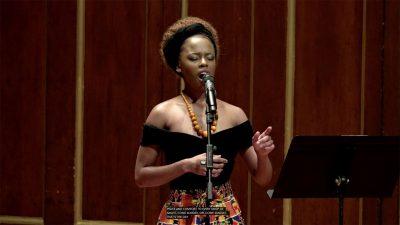For Martin Luther King Jr., Boston University is close to home — it’s where he earned his doctorate degree and the city where he met the woman he would marry.

Guest speakers and members of the Boston University community honored King by giving speeches, while Conservatory musicians performed musical tributes. HANNAH YOSHINAGA/ DAILY FREE PRESS STAFF
King’s vast contributions to the civil rights movement are celebrated annually throughout the nation, and by the BU community, which has been celebrating his memory before the national holiday was established.
“We really believe that we have one of the oldest MLK Day celebrations in the country,” Katherine Kennedy, director of Howard Thurman Center, said in an interview. “But it is our intention to have this MLK Day celebration be not just for the Boston University community, but for the entire city of Boston.”
This year’s Martin Luther King Jr. Day was celebrated virtually Monday through the Howard Thurman Center website, and was co-hosted by the City of Boston and the New England Conservatory.
The event consisted of live speeches delivered by BU faculty and students, and musical performances by the conservatory. Special guests included Mayor Marty Walsh, Director of the BU Center for Antiracist Research Ibram X. Kendi and Princeton University Professor Eddie Glaude.
Kennedy said the event also wanted to uplift Coretta Scott King, civil rights activist and author, especially with the upcoming construction of a monument in the Boston Common that will honor the Kings.
Walsh opened his statement by thanking the speakers and sponsors of the event, as well as the students attending. He said the day was “unlike any other holiday in our calendar” because it calls on people to reflect and has a particular meaning to Boston because of King’s role here.
“More than that, it’s a day when we take stock in how far we’ve come and we ask, ‘How can we do better in the coming year?’” he said. “Better in the deepest sense of the word.”
Walsh said this year, the city must turn these reflections into action, especially as it continues to battle a pandemic that has disproportionately affected Black Americans.
Karen Holmes Ward, director of Public Affairs and Community Services at WCVB and an alumna of the College of Communication, said King’s ideals remain important as the nation enters another period of racial justice protests.
“Dr. King’s vision, his words and his dream of a just world resonate today,” Ward said at the event, “after a season of sickness, a season of social unrest sparked by the death of African Americans at the hands of law enforcement.”
Ward added that the police brutality, the Black Lives Matter movement, the rejection of the presidential election results and the violent storming of the U.S. Capitol all echo the question King named his 1967 book after: “Where do we go from here: Chaos or Community?”
Jean Morrison, University provost and chief academic officer at BU, said a significant focus of the event was learning from history.
“We’ve got to recognize the failures of the past,” Morrison said in an interview, “in order to be able to do the critically important work of creating a truly just and equitable society going forward.”
Kennedy said in an interview that to get to a place of equality and understanding as King envisioned, the country must work toward unity and togetherness.
“There is disbelief by certain segments of our population that if you are not white, you are not worthy as a human being,” Kennedy said. “Until we get to a place where we can eradicate that notion, then unity, freedom, social justice, all of that, equality for all, will not exist in our country.”
Kennedy said to achieve unity, it’s important for Americans to look at others with different racial and ethnic backgrounds and recognize they all have a valuable, important message.
“If we can do that, then we can begin to heal,” Kennedy said. “If we are to take anything from Martin Luther King, [it] is be encouraged that he gave us a roadmap to follow, and there are others who are extending that roadmap and building upon that roadmap that we should listen to.”























































































































